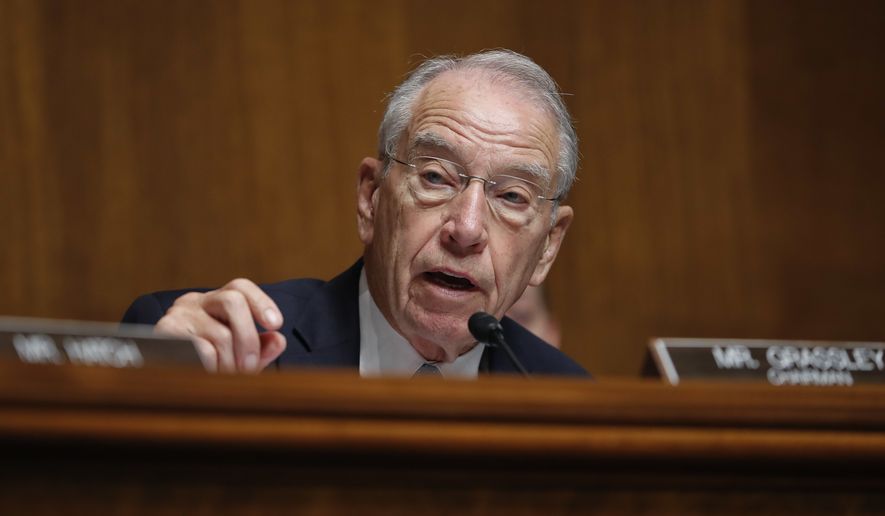The Homeland Security Department is granting as many citizenship applications as it can to try to sway participation in this year’s presidential election, an internal department document shows.
An email obtained by Senate Republicans shows a Texas immigration office demanded volunteers to work weekends, hoping to get as many people onto the citizenship rolls as possible before the end of September — which would give them enough time to register to vote in November.
Democrats and immigration groups had launched a drive to try to get eligible immigrants to become citizens in time to vote against Republican presidential nominee Donald Trump. The advocates fell well short of their goal of registering 1 million citizens, but the 600,000 they didn’t get to sign up by June have created a massive backlog that U.S. Citizenship and Immigration Services is now working through.
The memo from a branch chief at the USCIS Houston field office said in the July memo that the goal was to get as many applications approved as possible “due to the election year.”
Sens. Chuck Grassley of Iowa and Ron Johnson of Wisconsin, chairmen of two committees with oversight of the Homeland Security Department, demanded answers from Secretary Jeh Johnson.
“Your department seems intent on approving as many naturalization cases as quickly as possible at a time when it should instead be putting on the brakes and reviewing past adjudications,” the two Republicans said in a letter to Mr. Johnson.
They pointed to an audit this week that found more than 800 illegal immigrants from terrorism-connected regions of the globe who’d been ordered kicked out of the country, but who were instead approved for citizenship because USCIS didn’t properly check their fingerprints.
Last week USCIS told The Washington Times that no special efforts would be made to push citizenship applications through because of the looming election.
“We adjudicate applications, as well as educate and inform on the benefits of citizenship, irrespective of elections,” agency spokesman James R. McKinney told The Times.
The new email, though, contradicts that.
In a statement late Thursday, USCIS said it tries to approve applications within seven months of the time they’re filed. The agency said it predicted an increase this year ahead of the elections, but got caught flat-footed by how big the increase was.
“USCIS has detailed staff to offices experiencing increased workloads and has authorized overtime for many offices. USCIS has also shifted some workloads to other offices to meet our normal processing times,” said Shin Inouye, a spokesman for the agency.
“USCIS certainly encourages our naturalized citizens to be active participants in our democracy. However, like other citizens, no new U.S. citizen is required to register to vote, or participate in any election. The issue at hand is our desire to ensure naturalization applications are processed within our normal times,” the spokesman said.
In the first six months of 2012, which was the previous presidential election year, the agency received nearly 500,000 applications, and processed only about 363,000 of them. This year the agency received about 538,000 applications in the first six months, and approved nearly 367,000.
But in 2012 the agency didn’t appear to make a last-minute election push. In the final four months ahead of the election the agency made almost no progress on the 135,000-application backlog that built up in the previous months, according to a Washington Times analysis of agency statistics.
The push to approve new citizens in time for the election is not a new tactic. The Clinton administration attempted the same thing ahead of the 1996 election — with the result being massive fraud. Tens of thousands of people were approved despite criminal records, and nearly 200,000 were approved without going through fingerprint checks that could have revealed criminal records.
“We sincerely hope history is not repeating itself,” Mr. Grassley and Mr. Johnson wrote in their letter.
Immigrant- and Hispanic-rights advocates had entered 2016 with high hopes of a massive surge of new citizens eager to vote — and in particular to vote against Mr. Trump, who has made cracking down on illegal immigration a central point of his campaign.
There are some 8.8 million immigrants who have been in the U.S. for at least five years as legal permanent residents, making them eligible to apply for citizenship. Those immigrants are heavily Hispanic, and 30 percent are Mexican.
• Stephen Dinan can be reached at sdinan@washingtontimes.com.




Please read our comment policy before commenting.